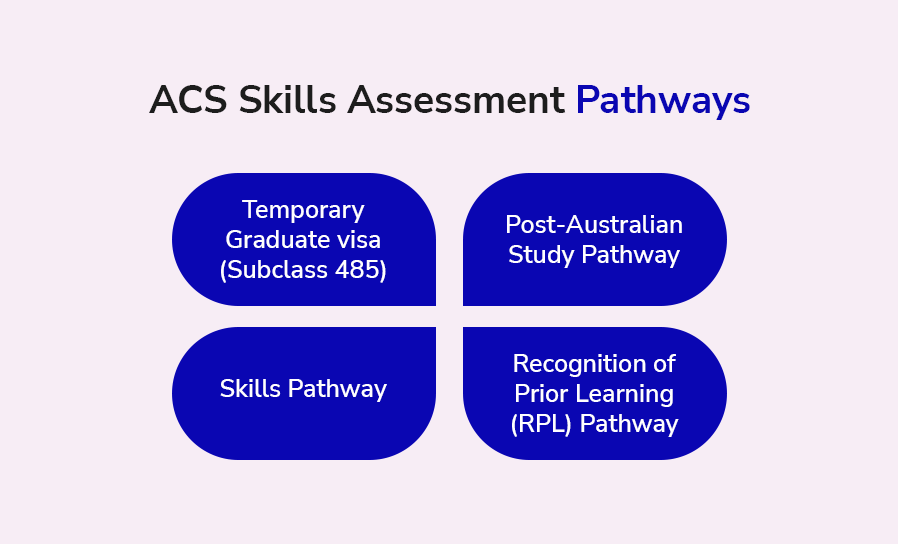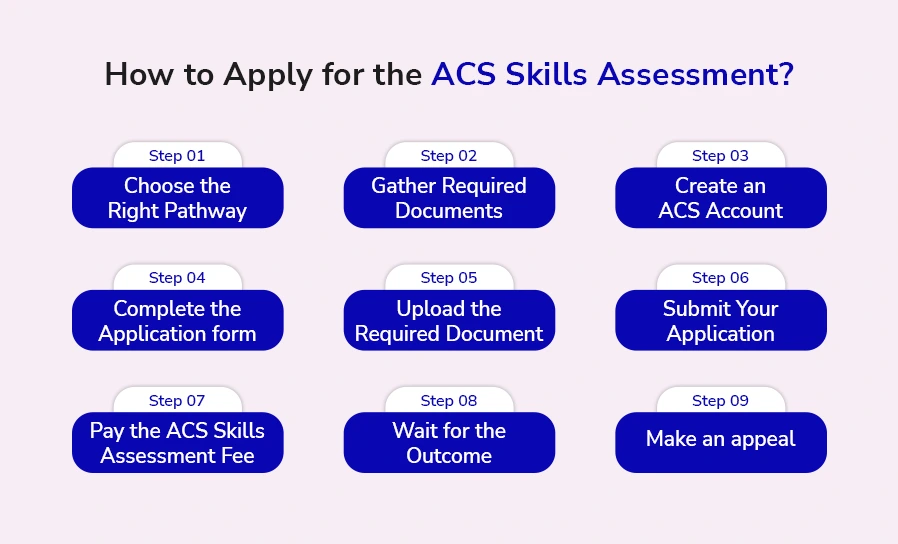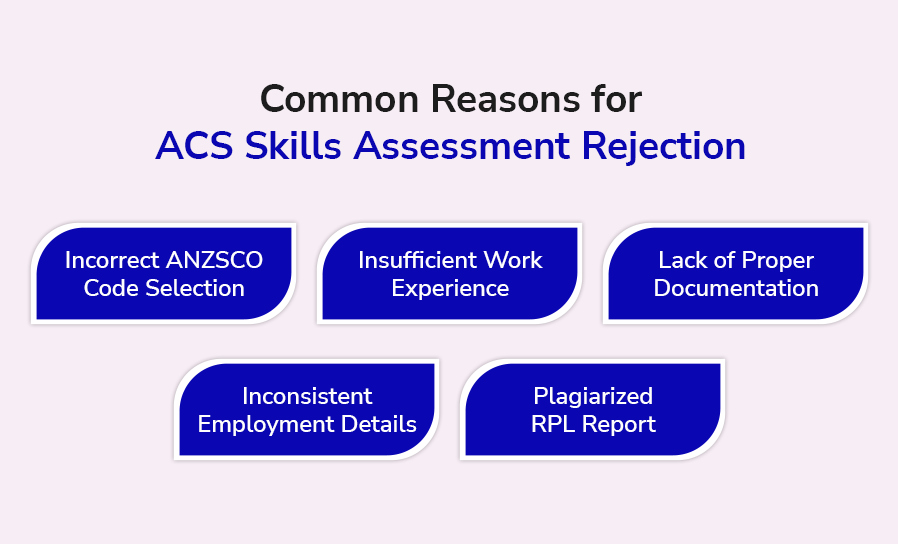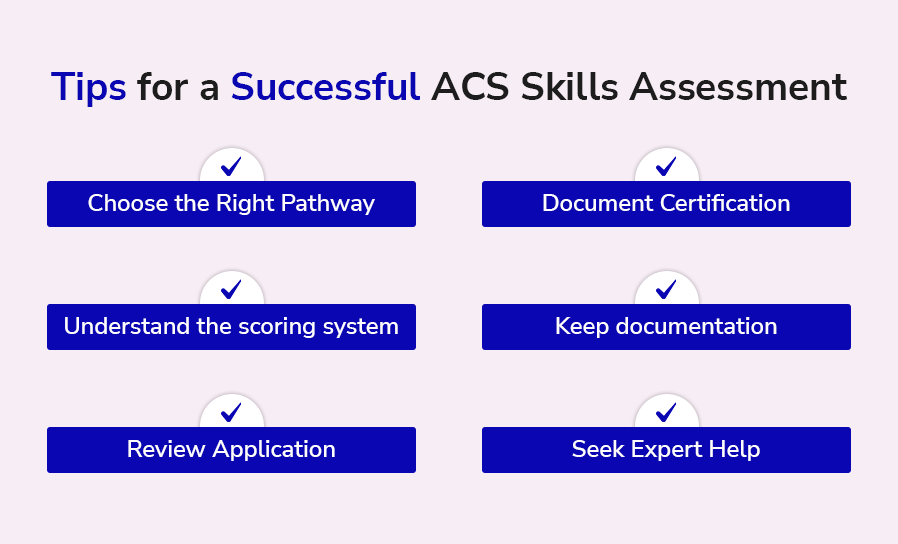ACS Skills Assessment: Everything You Need to Know for Australia Migration

ACS Skills Assessment: Everything You Need to Know for Australia Migration
The ACS (Australian Computer Society) Skills Assessment serves as an excellent initial step for your migration process. The Australian migration path is open for IT professionals who possess advanced skills.
The assessment verifies that your qualifications and work experience fulfil the requirements for Australian skilled migration.
This guide provides comprehensive information about ACS Skills Assessment for Skilled Migration to Australia by explaining the entire process and requirement collection and offering submission success strategies.
- ACS Skills Assessment: A mandatory check by the Australian Computer Society (ACS) to verify your IT qualifications and experience for skilled migration.
- For Skilled Migration to Australia: Required for ICT professionals applying under the General Skilled Migration (GSM) program (e.g., visas 189, 190, 491).
- Flexible Pathways: Choose from pathways like Temporary Graduate, Post-Australian Study, General Skills, or RPL (for those without an ICT degree).
- Docs and Success Tips: Submit certified documents, pick the right ANZSCO code, avoid RPL plagiarism, and consider expert help for better results.
💡 What is the ACS Skills Assessment?
The Australian Computer Society (ACS) applies the ACS Skills Assessment to determine whether your professional experience, education, and skill set meet the requirements for skilled migration to Australia.
The professionals in Australia seek the General Skilled Migration (GSM) programme for skilled visas.
Your eligibility for our desired occupation is assessed by the ACS in terms of the compatibility of your experience and qualifications with the Australian Standard Classification of Occupations (ANZSCO) codes.
You have to pass the ACS Skills Assessment to submit an Expression of Interest (EOI) by using the SkillSelect system.
🧑 Who Needs an ACS Skills Assessment?
IT workers who apply for skilled migration to Australia through the GSM program must complete the ACS Skills Assessment. They use the SOL (Skilled Occupation List) to nominate an IT occupation.
You must provide proof that their work experience and professional background satisfy Australian standards.
If your profession is on the SOL, you will need to take an ACS Skills Assessment regardless of whether you are a software engineer, network administrator, or data analyst.
ACS Skills Assessment Pathways

The ACS provides many ACS skill assessment pathways according to your qualifications and professional background. The most common pathways are:
✔️ Temporary Graduate visa (Subclass 485)
If you are an Australian IT fresh graduate, you can apply for a temporary graduate visa (Subclass 485).
✔️ Post-Australian Study Pathway
If you are a foreign student who has completed an IT degree, you can apply for permanent residency or a longer-term work visa.
✔️ Skills Pathway
If you have an IT degree and relevant work experience in the related IT field outside Australia, you can apply for the visa based on your talent and work expertise
✔️ Recognition of Prior Learning (RPL) Pathway
If you do not have any IT degree or academic qualification but have work experience in the related IT field, you can apply by submitting an RPL report.
All these pathways have their requirements. Since you are applying for the ACS Skills Assessment for Skilled Migration to Australia, choose the option most appropriate to your qualifications and eligibility.
🛞 ACS Skills Assessment Requirements
To be eligible for an ACS Skills Assessment, you are required to fulfil the following requirements:
🎓 Education
You should have a degree, diploma, or certificate in Information and Communication Technology (ICT) or equivalent discipline
📃 Work Experience
You must demonstrate at least 3 years of relevant experience working in ICT, as per qualification.
#️⃣ ANZSCO Code
You should select the right ANZSCO code that matches your occupation.
📝 English Language Proficiency
You need to meet English language proficiency by performing the test with the required mark in the TOEFL, PTE, or IELTS.
👨💻 Age
You should not be more than 45 years of age.
🗎 Documentation
You are required to provide certified copies of your qualifications, work references, and any other supporting papers.
📕 RPL Report
You will need to have an RPL report in case you apply without a full ICT degree or certification
🧾 Employee Evidence
As an employee of any ICT company, you should provide proof of employment, for example, letters of reference, payslips, and contracts.
💻 ACS Service
ACS is a professional organisation for tech workers that promotes the people, technology, and abilities that will drive Australia’s future.
ACS is permitted to evaluate the credentials and abilities of IT, data science, and cybersecurity specialists on behalf of the Australian Government.
Suppose you meet all the ACS skill assessment requirements. In that case, there are various kinds of visas like Skilled Independent Visa (subclass 189), Skilled Nominated Visa (subclass 190), and Skilled Work Regional (provisional) Visa (subclass 491) through which you are eligible to apply.
🗎 Required Documents for ACS Skills Assessment
You must provide the various essential documents to complete the ACS Skills Assessment process, such as:
🪪 Passport and Identification
Take a scanned copy of the passport bio page.
👩🎓 Academic Certificates
You carry the IT certificates and academic transcripts and make all your documents certified and translated into English if they’re in another language.
✉️ Employment reference letters
You should carry detailed job descriptions, employment duration, and responsibilities from employers.
🧾 Payslips and Tax Documents
The evidence of salary payments and employment is necessary.
📕 RPL Report (if applicable)
There is a requirement for a well-documented Recognition of Prior Learning (RPL) report.
📄 Resume/CV
Your updated resume is required, which shows detailed information, qualifications, and work experience.
🧾 Payment Receipt
Do not forget to take the payment receipt for the ACS Skills Assessment fee.
🤔 How to Apply for the ACS Skills Assessment?

The following is a step-by-step guide for applying for an ACS Skills Assessment:
✅ Step 1: Choose the Right Pathway
Select the correct assessment pathway that best suits your qualifications and experience.
✅ Step 2: Gather Required Documents
Prepare all the documents that you need, including certified copies of your qualifications, identity cards, and work references. See also that the documents are well formatted and arranged according to the ACS guidelines.
✅ Step 3: Create an ACS Account
The application is done online only, so you must first register for an account on the Australian Computer Society’s (ACS) official site.
✅ Step 4: Complete the Application form
In this phase, fill in the application with the right personal information, qualifications, employment evidence, and work experience
✅ Step 5: Upload the Required Document
Once the document is verified, upload the required document in the ACS portal. The assessment will check your documents, especially your educational qualification, English language proficiency, and work experience documents.
✅ Step 6: Submit Your Application
And finally, submit your application through the ACS portal.
✅ Step 7: Pay the ACS Skills Assessment Fee
You have to submit the required fee through the online payment system.
✅ Step 8: Wait for the Outcome
The ACS will process your application and email the outcome within 8–12 weeks. The processing period may vary based on the complexity and volume of the application
✅ Step 9: Make an appeal
If you find the outcome is not as you desire, you can appeal within 60 days of receiving the results.
🤞 ACS Skills Assessment Outcome
Once your application is processed, you’ll receive one of the following outcomes:
😀 Positive Assessment
Your skills and qualifications meet the ACS standards, and you can proceed with your skilled migration application.
😟 Negative Assessment
Your application does not meet the ACS requirements. You may need to provide additional documentation or reapply.
😐 Further Information Required
The ACS may also require further documentation or clarification before it makes a decision.
👨💻 Common Reasons for ACS Skills Assessment Rejection

Several reasons can be responsible for the rejection of an ACS Skills Assessment application:
#️⃣ Incorrect ANZSCO Code Selection
While applying the application choosing the incorrect ANZSCO code for your occupation category can make your ACS skills assessment reject
📃 Insufficient Work Experience
Your work experience not meeting the required number of years in an ICT-related role can make the assessment reject
🗎 Lack of Proper Documentation
One of the major reasons can be your missing or improperly formatted documents.
📑 Inconsistent Employment Details
Difference between job descriptions and actual work experience.
📕 Plagiarised RPL Report
Submitting an RPL report that is not original or lacks real content can be the reason of rejection.
To avoid all these rejections, ensure your application is complete, accurate, and meets all the ACS requirements.
✨ Tips for a Successful ACS Skills Assessment

The following advice should be followed by applicants to guarantee a seamless assessment process:
📍 Choose the Right Pathway
Select the assessment pathway that best matches your qualifications and experience.
📄 Document Certification
Submit certified copies of education qualifications, work experience, and employment evidence according to the guidelines of ACS.
🥅 Understand the scoring system
You have to learn about the points system’s operation and how it impacts your eligibility for different types of visas.
🗎 Keep documentation
To provide thorough evidence during the examination, keep thorough records of your professional experience and qualifications.
🗒️ Review Application
You have to remember to check the application for accuracy and completeness before submitting it on the ACS portal to avoid errors.
🤓 Seek Expert Help
Consider consulting a migration agent or ACS specialist who has a specialisation in ACS skill assessment for guidance.
💰ACS Skills Assessment Fees
The ACS Skills Assessment fee varies depending on the assessment pathway you are applying for:
✔️ Temporary Graduate 485 Pathway: AUD 600.
✔️ Post-Australian Study Pathway: AUD 1100.
✔️ General Skills Pathway: AUD 1450.
✔️ Recognition of Prior Learning Pathway: AUD 605
✔️ Level 1 Appeal Pathway: AUD 500
✔️ Level 2 Appeal Pathway: AUD 600
The ACS portal serves as the platform for online payment. The payment you make for the application process cannot be refunded regardless of assessment results.
🎯 Conclusion
The ACS Skills Assessment stands as a vital initial requirement for ICT workers who want to migrate their skills to Australia. The booming ICT sector of Australia offers new opportunities to candidates who submit a strong ACS Skills Assessment application.
The likelihood of obtaining a positive assessment outcome increases when you understand the necessary ACS assessment skills requirements, ACS assessment pathways, and required documentation.
The success of an application depends on detailed planning combined with accurate documentation and well-considered ANZSCO code selection.
❓ FAQs
1. What is the processing time for the ACS Skills Assessment process?
Your processing time for applications is 8 to 12 weeks from the submission date. The actual processing time of ACS skill assessment depends on many factors, like application volume and the correctness of documents.
2. Can I appeal a negative ACS Skills Assessment?
You have the right to ask for a review or appeal the ACS skill assessment decision within 60 days from the time you receive the results.
3. Can I do a skill assessment without qualification?
The RPL Pathway enables you to obtain an ACS Skills Assessment when you possess substantial IT work experience.
4. How long is an ACS Skills Assessment valid?
Your ACS skill assessment maintains its validity for two years starting from the date of issuance, but you need to renew it after this period expires.
 Chat with us
Chat with us